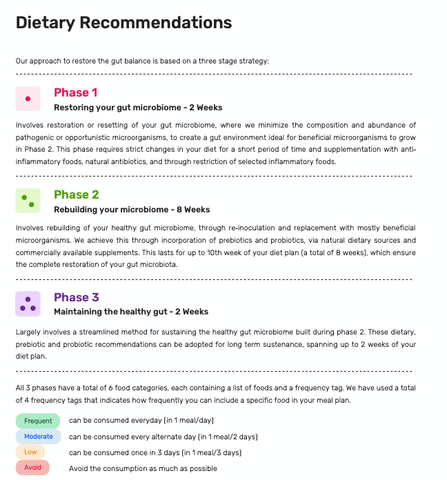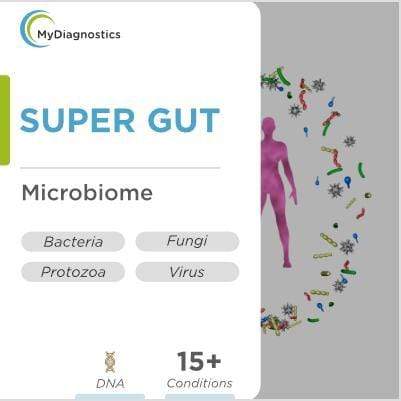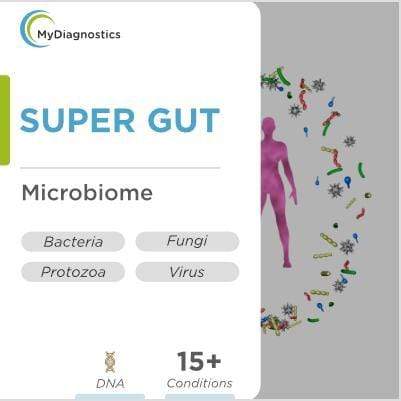Microbiome Testing & Analysis (Super Gut Microbiome Health Test)
Test Parameters

The gut microbiome test reveals what gut microbiota are present in your gut and the impact they have on your health. In your gut are trillions of bacteria and some three million genes. Collectively, these microbes contribute millions of genes, creating a 'second genome' that profoundly influences your health. Good gut bacteria is quite beneficial to your health and are essential for the proper functioning of your digestive system . The test can be ordered by a doctor who believes that something could be wrong with your digestion.
You carry more than 200 different types of bacteria and viruses or fungi in your digestive tract. These bacteria are capable of producing chronic illnesses such as inflammatory bowel disease and type 2 diabetes or heart disease or colon cancer, which can manifest as typical symptoms . In early diagnosis and you can manage the condition better and will get better results
What is Gut Microbiome Test
A biome is a distinct place on the planet that has a specific environment and life that inhabits it. One of these biomes is your gut microbiome, which is located within your intestines. It is home to trillions of minute life forms, including diverse gut microbiota . These minute life forms contain over a thousand different types of bacteria, viruses, fungi, other microorganisms, and parasites.
Your intestinal microbiome is not the same as all other people. When babies are born, they receive their initial gut microbes from their mother during birth (via the vaginal canal) and through breastfeeding. Subsequently, food you consume and other surroundings introduce additional microbes in your gut. Factors like diet, stress, and medications can negatively impact your gut microbiome, leading to digestive disruptions.
What Does a Gut Microbiome Test Measure?
These stool analysis tests analyze a stool sample to assess:
Bacterial composition
-
Determines what bacterial species are present (such as Bacteroides, Firmicutes, Lactobacillus, Akkermansia).
-
It provides the abundance of each microbe relative to the others.
Microbial diversity
-
Measures the number of species present of a given type (richness) and the evenness with which they are evenly distributed (evenness).
-
Increased diversity tends to result in improved gut health.
Pathogens vs. beneficial bacteria
-
It identifies dangerous bacteria like Clostridium difficile and Salmonella and verifies the presence of beneficial probiotic strains.
Metabolic function predictions (via metagenomic analysis):
-
Other tests examine the functionality of your intestinal microbes such as their ability to digest fiber and produce vitamins (including B vitamins and vitamin K) or short chain fatty acids such as butyrate.
Microbiome Analysis Techniques
Gut microbiome tests typically use one of these methods, including stool tests :
16S rRNA sequencing:
-
It analyzes one gene in bacteria to identify them and group them to the genus level, which is not so precise.
Metagenomic sequencing (shotgun sequencing):
-
It sequences all the DNA in a sample, providing information down to the species or even strain level and displaying what genes do, which is more detailed and more expensive.
Insights Provided by a Gut Microbiome Test
A microbiome test can offer personalized insights such as how lifestyle factors affect your gut health :
Digestive health:
-
The degree to which your microbes are good at deconstructing fiber, protein and fat.
-
There are microbes associated with bloating, IBS or constipation.
Dietary recommendations:
-
Recommend foods that favor good bacteria, including onions, garlic, beans and other prebiotic-rich foods.
-
Identify foods that may trigger inflammation or destabilize your own gut composition on your specific microbiota.
Immune function:
-
There are certain bacteria that regulate the functioning of your immune system. In case of an imbalance, it may be related to autoimmune issues or allergies.
Metabolic health:
-
There are others connected to the way you manage your weight, the way your body responds to sugar, and the risk of developing metabolic diseases.
Mental health links:
-
The gut brain connection reveals that your gut bacteria may influence mood, anxiety and thinking by forming chemicals that impact the brain or by triggering inflammation.
Why is Gut Health Important?
It all starts with your gut. It assists you to digest food and absorb nutrients and use them so that your body can operate. With an unbalanced gut and an inefficient immune system and your serotonin and hormones will be out of whack, the presence of a balanced gut microbiome and healthy bacteria is crucial, and staying healthy will be more difficult. Your gut also rids your body of waste and toxins. When it is unhealthy and the body cannot easily rid itself of these toxins or resulting in certain issues such as relentless fatigue and chronic diseases and inflammation everywhere. That is why the symptoms are related to brain fog or diarrhea and constipation, gas and joint pains. This is often called the 'gut-brain axis.' An imbalanced gut can send inflammatory signals to the brain, potentially affecting mood, cognitive function, and mental well-being.
Key Functions of a Healthy Gut
Digestion and Nutrient Absorption
The gastrointestinal tract digests and absorbs nutrients and eliminates waste or providing the body with energy.
Immune System Function:
The large intestine gut is home to most of the immune cells in the body and approximately 70-80% and it also assists the immune system to learn the distinction between good and bad germs.
Mental Health
The human gut microbiome and brain are connected, and a healthy human gut microbiota can boost mood and cognition, having profound implications for mental health.
Metabolism and Weight Management
A healthy gut microbiome has been shown to maintain metabolism and blood sugar regulation and influence the weight, contributing to overall well being .
Connection to Broader Health
Decreased Inflammation
Beneficial gut microbes produce substances that reduce inflammation which could assist in autoimmune diseases and other health issues.
Disease Prevention
healthy gut helps prevent many issues and including autoimmune diseases or some types of cancer and heart disease and type 2 diabetes.
Hormone Balancing
A balanced gut microbiome plays a crucial role in the production of correct hormones and balancing them, which is beneficial to digestive health and overall health.
Role of gut bacteria in digestion, immunity, mood, and metabolism
Our enteric bacteria assist in the digestive process of food, breaking it down and producing vitamins. They also assist our immunity to learn how to attack the germs and hold them in check. They influence our emotions as they produce chemicals that communicate with the brain. They affect our body energy use and storage. Good health greatly depends on a healthy combination of beneficial and harmful bacteria in the gut. When there are too many or too few types, it can lead to numerous health issues.
Digestion
Nutrient Breakdown
Gut bacteria aids us in the digestion of carbs and fibers that we are unable to perform on our own.
Vitamin Production
They are important sources of vitamins such as some B vitamins (B1, B9, B12) and vitamin K, both of which are vital to our health.
Metabolite Production
Bacteria generate short-chain fatty acids (SCFA) as products of their metabolism. These provide nourishment and energy to gut cells and maintain a healthy gut lining.
Waste Elimination
The microbiome aids in the breakdown of waste and eliminates it in our body, which is important for relieving digestive symptoms .
Immunity
-
The gut bacteria aid the immune system in learning and development, particularly during infancy.
-
They combat the bad germs in the gut by competing with them and preventing their settlement.
-
The immune system is balanced by the gut bacteria. They stimulate it with harmful germs and suppress it with harmless foods and other harmless substances.
Mood and Mental Health
Gut Brain Axis
Your gut and brain communicate with a system known as the gut-brain axis, through the use of nerves, hormones, and immune cells.
Production of neurotransmitters
Neurotransmitters are chemicals that relieve mood and behavior and are produced by bacteria in your gut.
Stress Response
Your gut microbes can influence your body response to stress and may also help prevent infectious diseases while modifying mental health disorders including anxiety and depression, as well as irritable bowel syndrome .
Metabolism
Energy Extraction
The microbiome in the gut can affect the overall body fat by defining how well your body extracts calories based on the food you consume.
Nutrient Bioavailability
These microorganisms change the environment in the intestines thus decreasing mineral absorption.
Digestion and absorption of fats and fat-soluble vitamins
Gut bacteria assist in digesting and absorbing bile salts which is necessary to break down fats and fat-soluble vitamins, as well as nutrients from whole grains .
These important functions are supported by a healthy and diverse gut microbiome, which can be assessed through gut microbiome testing . Disequilibrium (dysbiosis) can also play a role in a diverse spectrum of health problems.
Problems caused by stomach flora imbalance
An imbalance in the stomach flora or dysbiosis may result in digestive symptoms such as constipation and diarrhea or bloating and gas and heartburn as well as induce more widespread health effects including autoimmune disease and skin conditions (like eczema and acne), crohn's disease, and mood disorders (such as anxiety and depression) or fatigue and inadvertent weight gain or loss and predisposition to Irritable Bowel Syndrome (IBS). Dysbiosis also compromises the digestive capabilities of the body and may create inflammation that spreads to other body parts.
Digestive Problems
-
IBS is something that many develop after poor gut health.
-
The balance of bacteria may become disturbed (a shortage or surplus of good bacteria), which disrupts bowel movements.
-
When digestion is poor, the buildup of gas can become higher and the abdomen may feel full.
-
When the beneficial bacteria and acid present in the stomach is low, food can ferment in the stomach leading to discomfort.
-
Stomach flora imbalances may cause heartburn.
-
Not all intolerances are related to a malfunctioning gut.
Other Health Concerns
-
Autoimmune disorders have been attributed to an unbalanced gut, such as thyroid issues, rheumatoid arthritis and type 1 diabetes.
-
Gut inflammatory problems, which may arise because of a deficiency in beneficial bacteria, may present as skin disorders such as acne and eczema.
-
The gut-brain relationship is firmly established and gut disturbances can provoke anxiety, depression, and other mood disorders.
-
Dysfunctional gut health correlates with slowed and unexplainable fatigue, dragging, and irregular sleep habits.
-
Imbalanced gut flora might cause sudden weight gain or loss.
-
An unhealthy gut compromises the immune system, making one more prone to infections.
-
Dangerous pathogens within an unbalanced gut cause an inflammatory response in the body which is a predisposing factor to heart disease.
Benefits of checking gut health regularly
You can prevent chronic diseases and all that by simply monitoring your gut health at regular intervals. Having a healthy gut microbiome helps enhance your immunity and improves mental health, all starting with proper sample collection . Gut testing and changing your lifestyle, including taking probiotic supplements, can lead to a more stable mood, clear skin, more energy, and better hormone balance.
Benefits of regular gut health checks:
-
By observing gut health, issues can be identified early and thus the person can take immediate steps to prevent severe digestive diseases like IBS, autoimmune disease and metabolic diseases like diabetes.
-
A healthy gut microbiome is essential in a vibrant, balanced immune system and protection against infections.
-
The gut produces most of the serotonin (or the happy hormone) in the body. Caring for your gut reduces anxiety and depression and improves mood.
-
A balanced gut will increase nutrient absorption, resulting in healthier skin and hair, as well as regular energy levels and metabolism.
-
Gut bacteria aid the metabolism and regulation of hormones and estrogen. An unbalanced gut may cause a disruption of hormonal balance and eventually damage to health.
-
Gut Health testing, including microbiome testing, shows your individual gut composition and enables nutrition and lifestyle adjustments that can maximize your health.
How Our Gut Test Works
Understanding your gut health has never been easier. At MyDiagnostics Lab, we provide a seamless and scientifically backed process to analyze your gut microbiome and help you take charge of your health.
Step-by-Step Process
First, you need to book your appointment online.
You can choose collect sample at home service as well. You will get your easy to use, hygienic sample collection kit at your doorstep.
Then the blood is sent to our certified lab.
You will receive a personalized, gut microbiome report via email or app.
Why Choose MyDiagnostics?
-
We provide convenient service for customers. Entire process from your home – no appointments or travel needed
-
You will get accurate advanced DNA sequencing and meta genomics (where applicable)
-
MyDiagnostics is one of the best Certified Labs. NABL, ISO, and CAP-accredited lab partners ensure highest quality standards
-
You will get easy-to-understand report to help improve digestion, immunity, metabolism, and more.
Gut Microbiome Test in India
Availability of testing in India
-
Gut, stool, and microbiome testing is available in several diagnostic laboratories, fitness and wellness organizations, and through internet health websites throughout India.
-
Tests are available in large metro areas, such as Delhi, Mumbai, Bangalore, Hyderabad, Chennai, Kolkata, and most services offer kits throughout the country.
-
The majority of laboratories are either accredited by NABL or ISO. As an example, MyDiagnostics is a company that provides NABL and ISO certifications.
-
Home collection kits are typical. Businesses send a package to your front porch, and you send the stool sample in the prepaid package or request a pick up, no tests needed in the lab.
-
Turnaround times vary. It can take as little as two weeks (15 days) to get results in some labs, or as many as 3035 days depending on the test and the depth.
-
On the whole, India is well-covered with numerous convenient options. Microbiome testing is available via home collection and courier kits, and costs are affordable.
Why choose this test over others in the Indian market
Superior accuracy & scientific method
-
Consider more informative DNA-sequencing techniques, including full metagenomic sequencing, rather than simple techniques such as 16S rRNA sequencing. This will provide you with a better idea of the specific species and even strains that exist.
-
It also allows you to understand what the microbes are able to do. You can see whether they decompose fiber, produce vitamins, or have inflammatory pathways, among others.
Quality control and certification
-
Lab is accredited (NABL, ISO, or other appropriate accreditations) and hence sample handling, testing, and reporting is performed to a high standard.
-
Our measures to maintain the coldness of samples to preserve the microbial DNA are followed to the letter in order to avoid loss or bias.
Convenience
-
Bring samples from home.
-
Simple steps, easy assembly kit.
-
Pan‑India service: the kit or service will be shipped to you, even though you may be far away in the big cities.
Turnaround time
-
Faster reporting than many competitors aim for 2 weeks (or your target) rather than 30+ days.
-
Digital delivery of reports via app or email with options for follow‑up consultation.
Comprehensive report and actionable insights
-
We will not simply tell you which microbes are in your sample. Instead, we will simply provide you with a simple gut-health score, comparing it to some standard reference ranges and highlighting the pro- and anti-helpful bacteria.
-
We will base our recommendations on your daily life. we will propose dietary and lifestyle change, prescribe probiotic and prebiotic foods and advise you of foods that will fit into Indian cuisine: with local products, with the spices and foods you know and can buy in your local market.
-
You will also receive a consultation with a specialist (nutritionist or microbiologist) who will clarify the results in lay language and assist you in setting up the further actions regarding the improved condition of your gut.
What You’ll Learn from the Test
Our comprehensive gut microbiome test doesn’t just tell you what bacteria are living in your gut and it helps you understand how they impact your digestion, immunity, metabolism and overall health. Here’s what your personalized report will reveal:
Gut Bacteria Diversity
-
Discover the variety and balance of microbial species in your gut.
-
Understanding whether your microbiome is diverse and resilient is a key marker of good gut health.
-
Learn how your current diet and lifestyle may be affecting this balance.
Digestive Enzyme Activity
-
Find out how well your gut microbes help break down key food groups like fiber, proteins, fats, and carbohydrates.
-
Get insights into the production of important compounds like short chain fatty acids (SCFAs), which play a role in inflammation control and gut lining repair.
Pathogen & Imbalance Detection
-
Detects the presence of potentially harmful or overgrown bacteria (e.g., Candida, Clostridium, E. coli overgrowth).
-
Understand imbalances (dysbiosis) that may contribute to issues like bloating, IBS, fatigue, or skin problems.
Food Sensitivities & Gut-Immune Links
-
Identify microbial patterns associated with food intolerances (like lactose, gluten or histamine sensitivity).
-
Discover how your microbiome may be triggering low-grade inflammation or immune overreactions.
-
Insights into possible links to autoimmune conditions, allergies or skin flare ups.
Personalized Diet and Lifestyle Recommendations
-
Get science backed suggestions tailored to your microbiome — including:
-
Best foods to eat more or less of
-
Prebiotic and probiotic recommendations
-
Lifestyle changes to support long-term gut health
-
-
All recommendations are based on your unique microbiome profile and are aligned with Indian dietary patterns.
Who Should Take a Gut Health Test?
Individuals having digestive issues such as bloating, constipation or chronic diarrhea, and individuals feeling fatigued with no obvious cause, anxiousness, mood fluctuations or family members with gut issues ought to consider a gut health test or other gut health tests . It also allows individuals with allergies, food intolerance or perhaps vulnerable to diabetes or heart disease to also learn about their gut bacteria and take measures to ameliorate their general well-being.
Those with Digestive Problems
People who frequently experience bloating, gas, stomach pain, constipation or diarrhea can have an imbalanced gut microbiome.
Individuals with Consistent Gut Symptoms
Unless indigestion or stomach pains go away as a result of altering habits or using probiotics, a test may disclose the actual cause.
People with Chronic Health Conditions
In case of gut infections, IBS, inflammatory bowel disease, you can learn about your gut health to help.
With Unexplained Fatigue or Mood Changes
An unbalanced gut, often overrun by bad bacteria, can lead to low energy, mood swings, and anxiety, so a gut health test can be beneficial.
Individuals with Food Intolerances or Allergies
A gut health test, often with a reasonable gut microbiome test price, has the power to reveal any imbalances which cause an allergic reaction or difficulty in digesting certain foods.
People at risk of metabolic diseases
Unhealthy gut bacteria, such as escherichia coli, can disrupt the balance of bile acids and may increase the chances of heart disease, type 2 diabetes, and liver issues, and diet changes along with testing can help to detect issues in their early stages.
Individuals desiring to keep an eye on the way of life alterations
In the event that you make substantial changes to your diet and practices, testing can demonstrate how your gut is performing and maintain it in a healthy condition.













